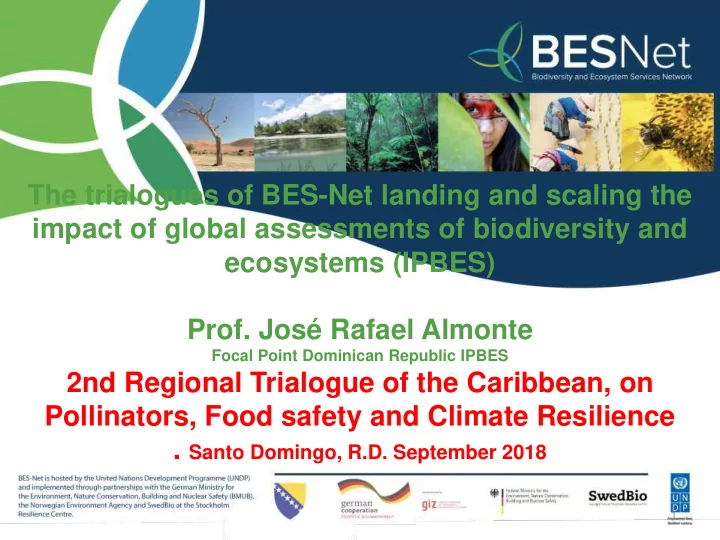

The trialogues of BES-Net landing and scaling the impact of global assessments of biodiversity and ecosystems (IPBES) Prof. José Rafael Almonte Focal Point Dominican Republic IPBES 2nd Regional Trialogue of the Caribbean, on Pollinators, Food safety and Climate Resilience . Santo Domingo, R.D. September 2018 1
Who participated? Antigua y Barbuda Cuba Granada Saint Kitts y Nevis Santa Lucia Trinidad y Tobago Dominican Republic 2
¿ What are the Trialogues? ? They are multi-sectoral dialogues on complex information to generate changes in public policy and practice at the regional and national level in response to the results of global assessments IPBES. They are dialogues between the three communities: science, Government and civil society. They are a key element of the BES-Net program of capacity building in support of the overall biodiversity assessments and ecosystems of IPBES. 3
Why a Trialogue? The literature shows that the scientific reports and the one-way transfer of information is not enough if same to strengthen capacities and to achieve effective and inclusive decision making. ¨It requires the flow of information in multiple directions--up and down, and down-up to overcome barriers in intersectorial coordination (environment, infrastructure, agriculture, energy) which translates into conflicts in practice and the loss of species and habitats¨ (IPBES Summary for Policy Makers) 4
¿Why the Trialogues? To Bridge the gap between the sectors of science, policy and practice. To Create a shared space to analyze the results of the evaluation of IPBES altogether and share regional, national, and local knowledge. To Identify options for public policy altogether, generate commitments and build a common action agenda. 5
Landing the results and co-creating a common action schedule 6
How to do it? 1.Preparing (regional and national contextualization Based on Document and identification of participants from the 3 sectors) 2.Facilitation (expert methodology in 3-day event) 3.Co-creation of Agenda for Action 7
Landing the results and co-creating a common action schedule Context Document 8
Landing the results and co-creating a common action schedule 9
Field visits and food produced by pollinators 10
11
Action plan Assuming regional and national commitments in the short and medium term 12
13
Recommend
More recommend